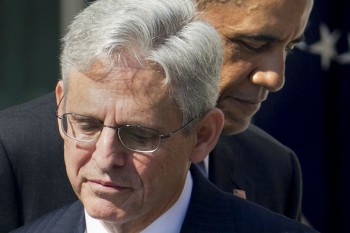
Federal appeals court judge Merrick Garland, with President Barack Obama as he is introduced as Obama’s nominee for the Supreme Court during an announcement in the Rose Garden of the White House, in Washington, Wednesday, March 16, 2016. Garland, 63, is the chief judge for the United States Court of Appeals for the District of Columbia Circuit, a court whose influence over federal policy and national security matters has made it a proving ground for potential Supreme Court justices.
BECKLEY, W.Va. — West Virginia’s U.S. senators had mixed reactions to President Barack Obama’s Supreme Court nomination Wednesday, with Sen. Shelley Moore Capito holding the Republican Party line of holding off a confirmation until after the November election.
President Obama nominated Chief Judge Merrick Garland to replace Justice Antonin Scalia, who died last month.
Scalia, one of the court’s most conservative justices, was an “originalist,” believing that the U.S. Constitution means what its authors wrote, instead of a document that develops with time.
Scalia’s death caused immediate reaction from the U.S. Senate where Majority Leader Mitch McConnell, R-Ky., said the Senate would not hold confirmation hearings regardless of whom the president nominated.
Other Republican lawmakers tried to cite a “tradition” of not appointing a justice in an election year.
According to Politifact, the circumstance of having a vacancy on the high court during the final year of a presidential term is rare, but it has happened three times: in 1968, 1932 and 1912.
It is the constitutional duty of the president to make a Supreme Court nomination and the duty of the U.S. Senate to confirm or deny that nomination after a hearing process.
Capito said since the appointment of a U.S. Supreme Court Justice is for life, the decision should not be made by the president of the U.S., but by voters this November. Capito said her position did not change when she heard Garland was the nominee…






